Schmitt C.B. (ed.) The Cambridge History of Renaissance Philosophy
Подождите немного. Документ загружается.

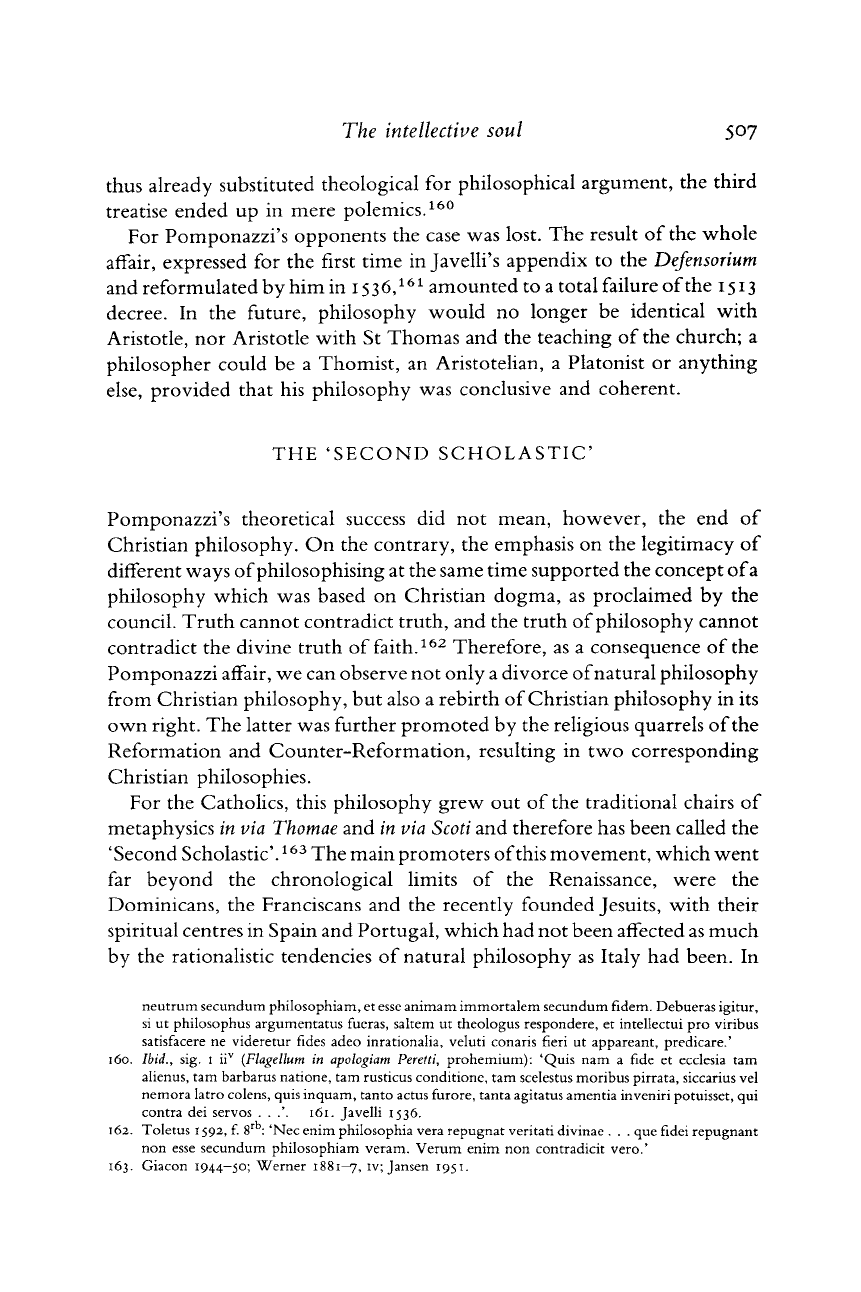
The intellective soul
507
thus
already substituted theological
for
philosophical argument,
the
third
treatise ended
up in
mere polemics.
160
For Pomponazzi's opponents
the
case
was
lost.
The
result
of the
whole
affair,
expressed
for the
first time
in
Javelli's appendix
to the
Defensorium
and reformulated
by him in
15
3
6,
161
amounted
to a
total failure
of
the 1513
decree.
In the
future, philosophy would
no
longer
be
identical with
Aristotle,
nor
Aristotle with
St
Thomas
and the
teaching
of the
church;
a
philosopher could
be a
Thomist,
an
Aristotelian,
a
Platonist
or
anything
else,
provided
that
his
philosophy
was
conclusive
and
coherent.
THE
'SECOND
SCHOLASTIC
Pomponazzi's theoretical success
did not
mean, however,
the end of
Christian philosophy.
On the
contrary,
the
emphasis
on the
legitimacy
of
different
ways
of
philosophising
at the
same time supported
the
concept
of
a
philosophy which
was
based
on
Christian dogma,
as
proclaimed
by the
council.
Truth cannot contradict
truth, and the truth
of
philosophy cannot
contradict
the
divine
truth of
faith.
162
Therefore,
as a
consequence
of the
Pomponazzi affair,
we can
observe
not
only
a
divorce
of
natural
philosophy
from Christian philosophy,
but
also
a
rebirth
of
Christian philosophy
in its
own
right.
The
latter
was further promoted
by the
religious quarrels
of
the
Reformation
and
Counter-Reformation, resulting
in two
corresponding
Christian philosophies.
For
the
Catholics, this philosophy grew
out of the
traditional chairs
of
metaphysics
in via
Thomae
and in via
Scoti
and
therefore
has
been called
the
'Second
Scholastic'.
163
The main promoters
of
this movement, which went
far beyond
the
chronological limits
of the
Renaissance, were
the
Dominicans,
the
Franciscans
and the
recently founded Jesuits, with their
spiritual centres
in
Spain
and
Portugal, which
had not
been affected
as
much
by
the
rationalistic tendencies
of
natural
philosophy
as
Italy
had
been.
In
neutrum secundum philosophiam, et
esse
animam immortalem secundum fidem. Debueras igitur,
si ut philosophus argumentatus fueras, saltern ut theologus responderé, et intellectui pro viribus
satisfacere ne videretur fides adeo inrationalia, veluti conaris fieri ut appareant, predicare.'
160. Ibid.,
sig. 1 ii
v
{Flagellum
in
apologiam Peretti,
prohemium): 'Quis nam a fide et ecclesia tarn
alienus, tarn barbarus natione, tarn rusticus conditione, tarn
scelestus
moribus pirrata, siccarius vel
nemora latro colens, quis inquam, tanto actus furore, tanta agitatus amentia inveniri potuisset, qui
contra dei servos . . .'. 161. Javelli 1536.
162.
Toletus 1592, f 8
rb
: 'Nec enim philosophia vera repugnat veritati divinae . . . que fidei repugnant
non
esse
secundum philosophiam veram. Verum enim non contradicit vero.'
163.
Giacon 1944-50; Werner
1881—7,
iv; Jansen 1951.
Cambridge Histories Online © Cambridge University Press, 2008
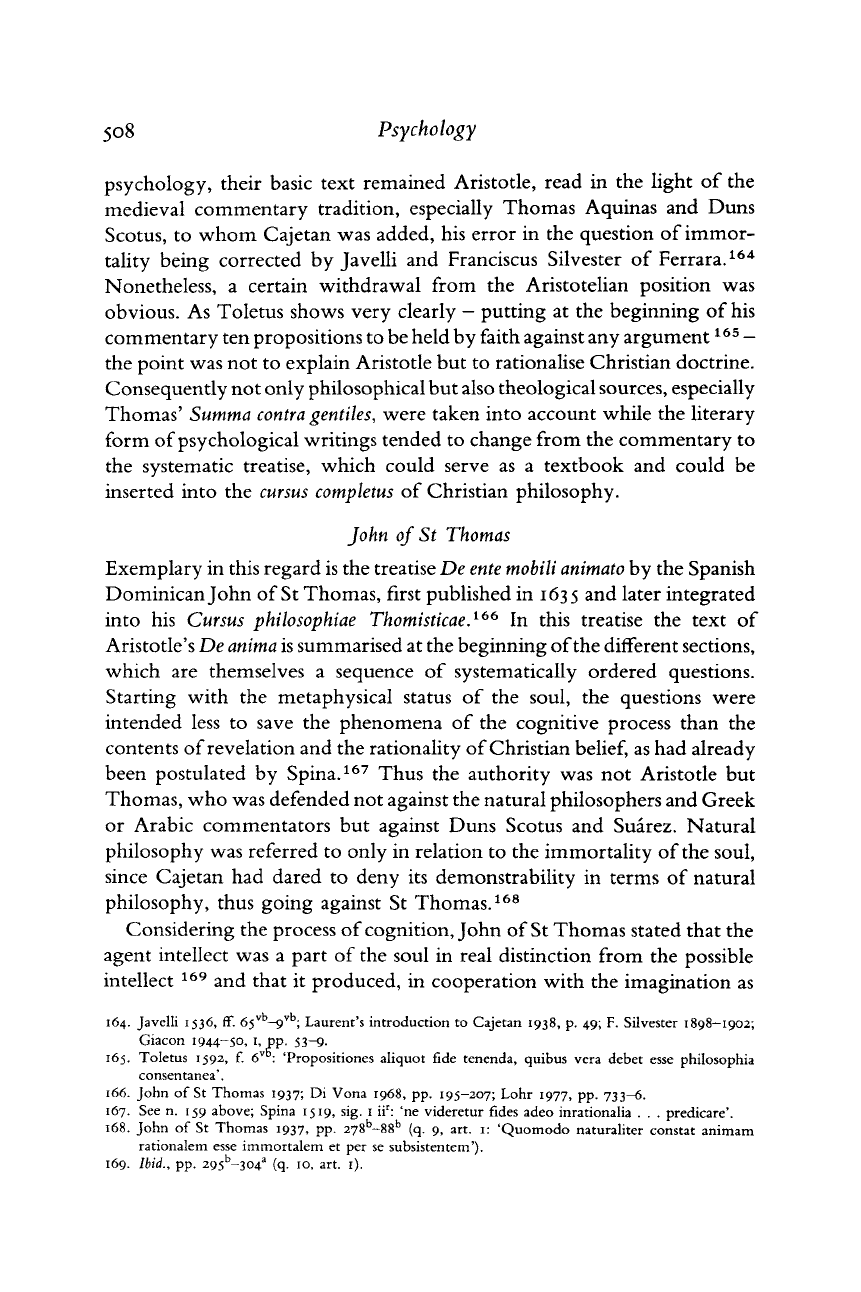
508
Psychology
psychology,
their basic text remained Aristotle, read in the light of the
medieval
commentary tradition, especially Thomas Aquinas and Duns
Scotus,
to whom Cajetan was added, his error in the question of immor-
tality being corrected by Javelli and Franciscus Silvester of Ferrara.
164
Nonetheless,
a certain withdrawal from the Aristotelian position was
obvious.
As Toletus shows very clearly - putting at the beginning of his
commentary ten propositions to be held by faith against any argument
165
-
the point was not to explain Aristotle but to rationalise Christian doctrine.
Consequently
not only philosophical but also theological sources, especially
Thomas'
Summa
contra gentiles, were taken into account while the literary
form
of
psychological
writings tended to change from the commentary to
the systematic treatise, which could serve as a textbook and could be
inserted into the cursus completus of Christian philosophy.
John of St Thomas
Exemplary
in this regard is the treatise De ente mobili
animato
by the Spanish
Dominican
John
of St Thomas, first published in 1635 and later integrated
into his Cursus philosophiae Thomisticae.
166
In this treatise the text of
Aristotle's
De anima is summarised at the beginning
of
the different sections,
which
are themselves a sequence of systematically ordered questions.
Starting with the metaphysical status of the soul, the questions were
intended less to save the phenomena of the cognitive process
than
the
contents
of
revelation
and the rationality of Christian belief, as had already
been postulated by Spina.
167
Thus the authority was not Aristotle but
Thomas,
who was defended not against the natural philosophers and Greek
or Arabic commentators but against Duns Scotus and Suárez. Natural
philosophy was referred to only in relation to the immortality of the soul,
since
Cajetan had dared to deny its demonstrability in terms of natural
philosophy,
thus
going against St Thomas.
168
Considering
the process of cognition,
John
of St Thomas stated
that
the
agent intellect was a
part
of the soul in real distinction from the possible
intellect
169
and
that
it produced, in cooperation with the imagination as
164.
Javelli
1536, ff.
65
vb
-9
vb
;
Laurent's
introduction
to
Cajetan
1938, p. 49; F.
Silvester 1898-1902;
Giacon
1944-50,
1, pp. 53-9.
165.
Toletus
1592, f. 6
vb
:
'Propositions
aliquot
fide
tenenda,
quibus
vera
debet
esse
philosophia
consentanea'.
166.
John
of St
Thomas
1937; Di
Vona
1968, pp.
195-207;
Lohr
1977, pp.
733-6.
167. See n. 159
above;
Spina
1519, sig. 1 ii
r
: 'ne
videretur
fides
adeo
inrationalia
. . .
predicare'.
168.
John
of St
Thomas
1937, pp.
278
b
-88
b
(q. 9, art. 1:
'Quomodo
naturaliter
constat
animam
rationalem
esse
immortalem
et per se
subsisten
tern').
169. Ibid., pp.
295
b
-304
a
(q. 10, art. 1).
Cambridge Histories Online © Cambridge University Press, 2008
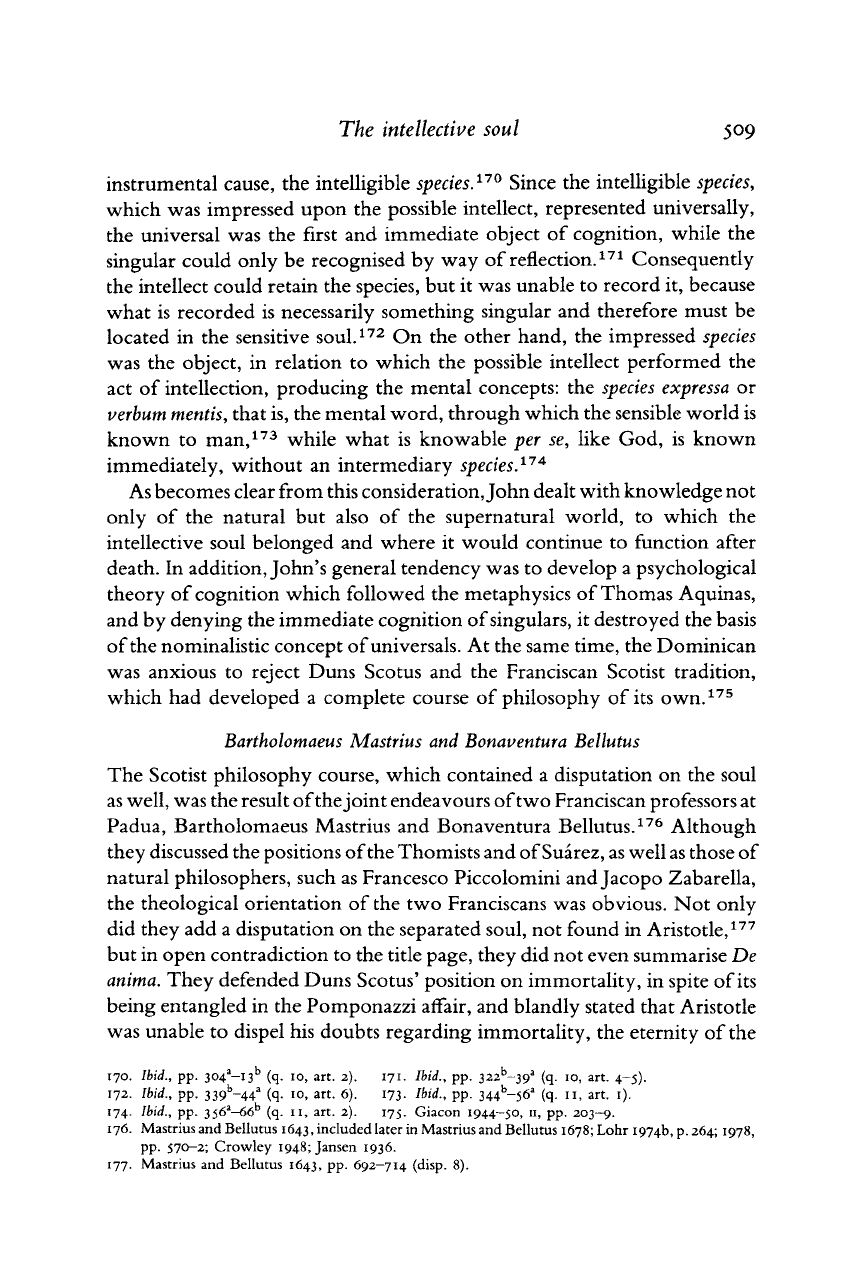
The intellective soul
509
instrumental cause, the intelligible species.
110
Since the intelligible species,
which
was impressed upon the possible intellect, represented universally,
the universal was the first and immediate object of cognition, while the
singular could only be recognised by way of reflection.
171
Consequently
the intellect could retain the species, but it was unable to record it, because
what is recorded is necessarily something singular and therefore must be
located in the sensitive soul.
172
On the other
hand,
the impressed species
was
the object, in relation to which the possible intellect performed the
act of intellection, producing the mental concepts: the species expressa or
verbum
mentis,
that
is, the mental word, through which the sensible world is
known to man,
173
while what is knowable per se, like God, is known
immediately, without an intermediary species.
174
As
becomes clear from this consideration,
John
dealt with knowledge not
only
of the
natural
but also of the
supernatural
world, to which the
intellective
soul belonged and where it would continue to function after
death. In addition,
John's
general tendency was to develop a psychological
theory of cognition which
followed
the metaphysics of Thomas Aquinas,
and by denying the immediate cognition
of
singulars, it destroyed the basis
of
the nominalistic concept
of
universals. At the same time, the Dominican
was
anxious to reject Duns Scotus and the Franciscan Scotist tradition,
which
had developed a complete course of philosophy of its own.
175
Bartholomaeus Mastrius and Bonaventura Bellutus
The
Scotist philosophy course, which contained a disputation on the soul
as
well,
was the result
of
the joint endeavours
of
two
Franciscan professors at
Padua, Bartholomaeus Mastrius and Bonaventura Bellutus.
176
Although
they discussed the positions
of
the Thomists and
of
Suarez,
as
well
as those of
natural
philosophers, such as Francesco Piccolomini and Jacopo Zabarella,
the theological orientation of the two Franciscans was obvious. Not only
did they add a disputation on the separated soul, not found in Aristotle,
177
but in open contradiction to the title page, they did not even summarise De
anima.
They defended Duns Scotus' position on immortality, in spite
of
its
being entangled in the Pomponazzi affair, and blandly stated
that
Aristotle
was
unable to dispel his doubts regarding immortality, the eternity of the
170. Ibid., pp.
304
a
-i3
b
(q. 10, art. 2). 171. Ibid., pp.
322
b
~39
a
(q. 10, art. 4-5).
172.
Ibid., pp.
339
b
~44
a
(q- 10, art. 6). 173• Ibid., pp.
344
b
-s6
a
(q. 11, art. 1).
174. Ibid., pp.
356
a
-66
b
(q. 11, art. 2). 175.
Giacon
1944-50,
11, pp.
203-9.
176.
Mastrius
and
Bellutus
1643,
included
later
in
Mastrius
and
Bellutus
1678;
Lohr
1974b,
p. 264; 1978,
pp.
570-2;
Crowley
1948;
Jansen
1936.
177.
Mastrius
and
Bellutus
1643, pp.
692-714
(disp.
8).
Cambridge Histories Online © Cambridge University Press, 2008
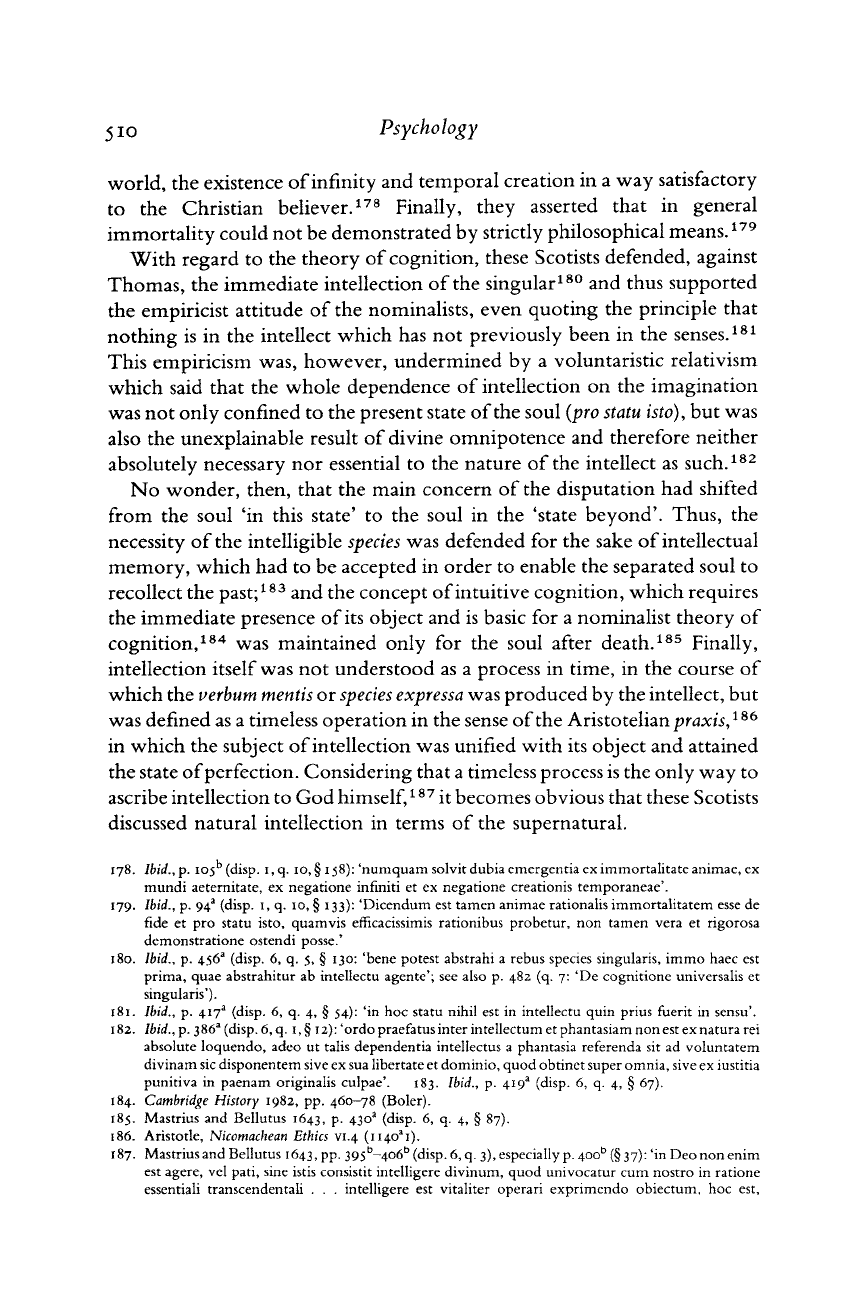
510
Psychology
world,
the
existence
of
infinity
and
temporal creation
in a way
satisfactory
to
the
Christian believer.
178
Finally, they asserted
that
in
general
immortality could
not be
demonstrated
by
strictly philosophical means.
179
With
regard
to the
theory
of
cognition, these Scotists defended, against
Thomas,
the
immediate intellection
of the
singular
180
and
thus
supported
the empiricist
attitude
of the
nominalists, even quoting
the
principle
that
nothing
is in the
intellect which
has not
previously been
in the
senses.
181
This
empiricism
was,
however, undermined
by a
voluntaristic relativism
which
said
that
the
whole dependence
of
intellection
on the
imagination
was
not
only confined
to the
present state
of
the soul
(pro
statu
isto),
but was
also
the
unexplainable result
of
divine omnipotence
and
therefore neither
absolutely necessary
nor
essential
to the
nature
of the
intellect
as
such.
182
No
wonder, then,
that
the
main concern
of the
disputation
had
shifted
from
the
soul
'in
this state'
to the
soul
in the
'state beyond'. Thus,
the
necessity
of the
intelligible species
was
defended
for the
sake
of
intellectual
memory, which
had to be
accepted
in
order
to
enable
the
separated soul
to
recollect
the
past;
183
and the
concept
of
intuitive cognition, which requires
the immediate presence
of
its object
and is
basic
for a
nominalist theory
of
cognition,
184
was
maintained only
for the
soul after death.
185
Finally,
intellection itself was
not
understood
as a
process
in
time,
in the
course
of
which
the
verbum
mentis
or
species expressa was produced
by the
intellect,
but
was
defined
as a
timeless operation
in the
sense
of
the Aristotelian praxis,
186
in which
the
subject
of
intellection
was
unified with
its
object
and
attained
the state
of
perfection. Considering
that
a
timeless process is
the
only way
to
ascribe intellection
to
God himself,
187
it
becomes obvious
that
these Scotists
discussed natural intellection
in
terms
of the
supernatural.
178. Ibid.,p.
I05
b
(disp. i,q. 10,§ 158): numquamsolvitdubiaemergentiaeximmortalitateanimae,ex
mundi aeternitate, ex negatione infmiti et ex negatione creationis temporaneae'.
179. Ibid.,
p. 94
a
(disp. 1, q. 10, § 133): 'Dicendum est tamen animae rationalis immortalitatem
esse
de
fide et pro statu isto, quamvis emcacissimis rationibus probetur, non tamen vera et rigorosa
demonstratione ostendi posse.'
180. Ibid.,
p. 456
s
(disp. 6, q. 5, § 130: 'bene potest abstrahi a rebus species singularis, immo haec est
prima,
quae abstrahitur ab intellectu agente'; see also p. 482 (q. 7: 'De cognitione universalis et
singularis').
181. Ibid.,
p. 417
s
(disp. 6, q. 4, § 54): 'in hoc statu nihil est in intellectu quin prius fuerit in sensu'.
182. Ibid.,
p.
386
s
(disp. 6, q. 1, § 12): 'ordo praefatus inter intellectum et phantasiam non est ex natura rei
absolute loquendo, adeo ut talis dependentia intellectus a phantasia referenda sit ad voluntatem
divinam
sic disponentem sive ex sua libertate et dominio, quod obtinet super omnia, sive ex iustitia
punitiva
in paenam originalis culpae'. 183.
Ibid.,
p. 419
s
(disp. 6, q. 4, § 67).
184. Cambridge History
1982, pp.
460-78
(Boler).
185.
Mastrius and Bellutus 1643, p.
430
a
(disp. 6, q. 4, § 87).
186.
Aristotle,
Nicomachean Ethics
vi.4
(ii40
a
i).
187.
Mastrius and Bellutus 1643, pp. 395
b_
4o6
b
(disp. 6, q. 3), especially p.
400
b
(§ 37): 'in Deo non enim
est agere, vel pati,
sine
istis
consistit intelligere divinum, quod univocatur cum nostro in ratione
essentiali transcendentali . . . intelligere est vitaliter operari exprimendo obiectum, hoc est,
Cambridge Histories Online © Cambridge University Press, 2008
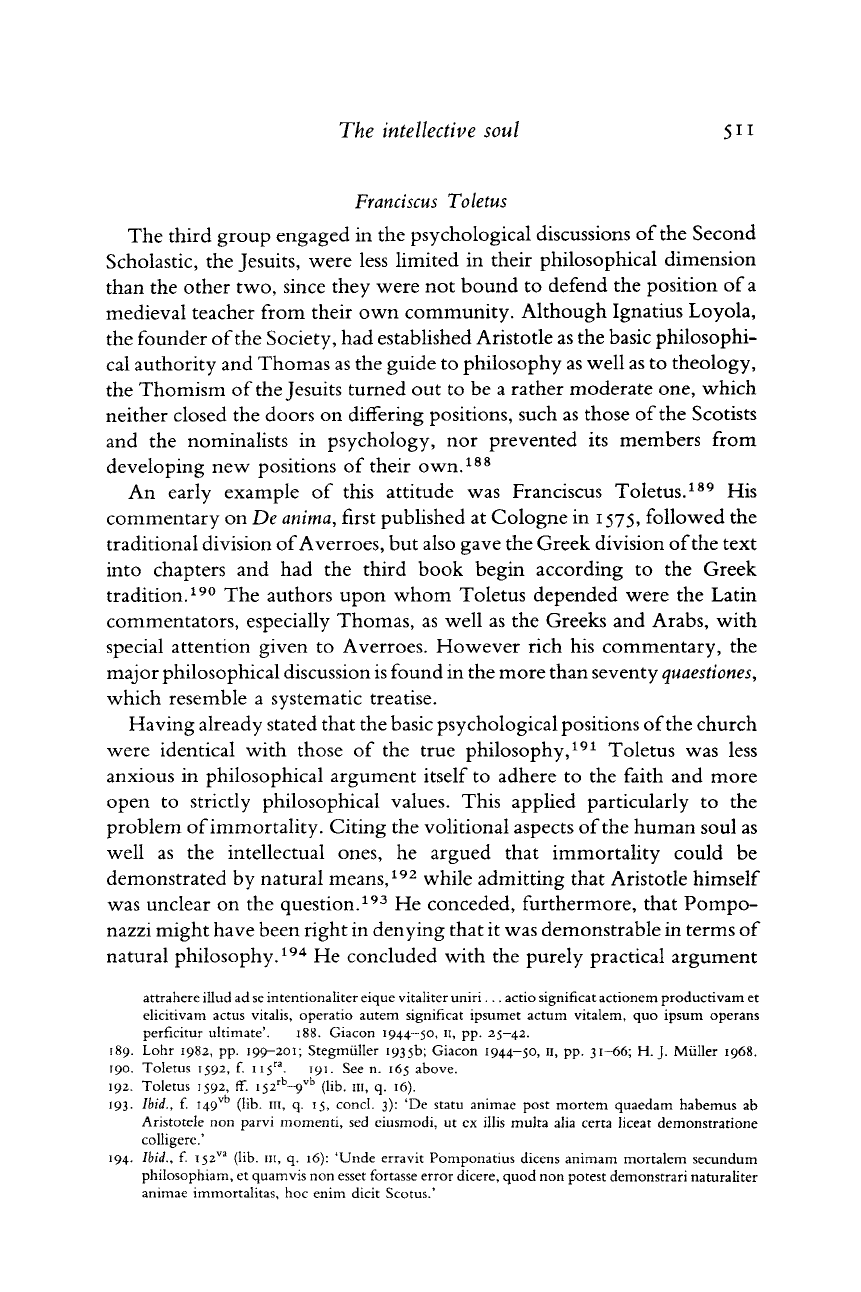
The intellective soul
5ii
Franciscus Toletus
The
third
group engaged in the psychological discussions of the Second
Scholastic,
the Jesuits, were less limited in their philosophical dimension
than
the other two, since they were not bound to defend the position of a
medieval
teacher from their own community. Although Ignatius
Loyola,
the founder
of
the Society, had established Aristotle as the basic philosophi-
cal
authority and Thomas as the guide to philosophy as
well
as to theology,
the Thomism of the Jesuits
turned
out to be a
rather
moderate one, which
neither closed the doors on differing positions, such as those of the Scotists
and the nominalists in psychology, nor prevented its members from
developing
new positions of their own.
188
An
early example of this
attitude
was Franciscus Toletus.
189
His
commentary on De anima, first published at Cologne in
1575,
followed the
traditional division
of
Averroes,
but also gave the Greek division
of
the text
into chapters and had the
third
book begin according to the Greek
tradition.
190
The authors upon whom Toletus depended were the Latin
commentators, especially Thomas, as
well
as the Greeks and Arabs, with
special
attention given to Averroes. However rich his commentary, the
major philosophical discussion is found in the more
than
seventy quaestiones,
which
resemble a systematic treatise.
Having
already stated
that
the basic psychological positions
of
the church
were identical with those of the
true
philosophy,
191
Toletus was less
anxious in philosophical argument itself to adhere to the faith and more
open to strictly philosophical values. This applied particularly to the
problem
of
immortality. Citing the volitional aspects
of
the human soul as
well
as the intellectual ones, he argued
that
immortality could be
demonstrated by natural means,
192
while admitting
that
Aristotle himself
was
unclear on the question.
193
He conceded, furthermore,
that
Pompo-
nazzi
might have been right in denying
that
it was demonstrable in terms of
natural philosophy.
194
He concluded with the purely practical argument
attrahere
illud
ad se
intentionaliter
eique
vitaliter
uniri...
actio
significat
actionem
productivam
et
elicitivam
actus
vitalis,
operatio
autem
significat
ipsumet
actum
vitalem,
quo
ipsum
operans
perficitur
ultimate'.
188.
Giacon
1944-50,
11, pp.
25-42.
189. Lohr 1982, pp.
199-201;
Stegmiiller
1935b;
Giacon
1944-50,
11, pp.
31-66;
H.J.
Muller
1968.
190.
Toletus
1592, f. 115
ra
. 191.
Seen.
165
above.
192.
Toletus
1592, ff.
i52
rb
-9
vb
(lib. in, q. 16).
193. Ibid., f.
I49
vb
(Hb. in, q. 15,
concl.
3): 'De
statu
animae
post
mortem
quaedam
habemus
ab
Aristotele
non
parvi
momenti,
sed
eiusmodi,
ut ex
illis
multa
alia
certa
liceat
demonstratione
colligere.'
194. Ibid., f. 152™ (lib. in, q. 16):
'Unde
erravit
Pomponatius
dicens
animam
mortalem
secundum
philosophiam,
et
quamvis
non
esset
fortasse
error
dicere,
quod
non
potest
demonstrari
naturaliter
animae
immortalitas,
hoc
enim
dicit
Scotus.'
Cambridge Histories Online © Cambridge University Press, 2008
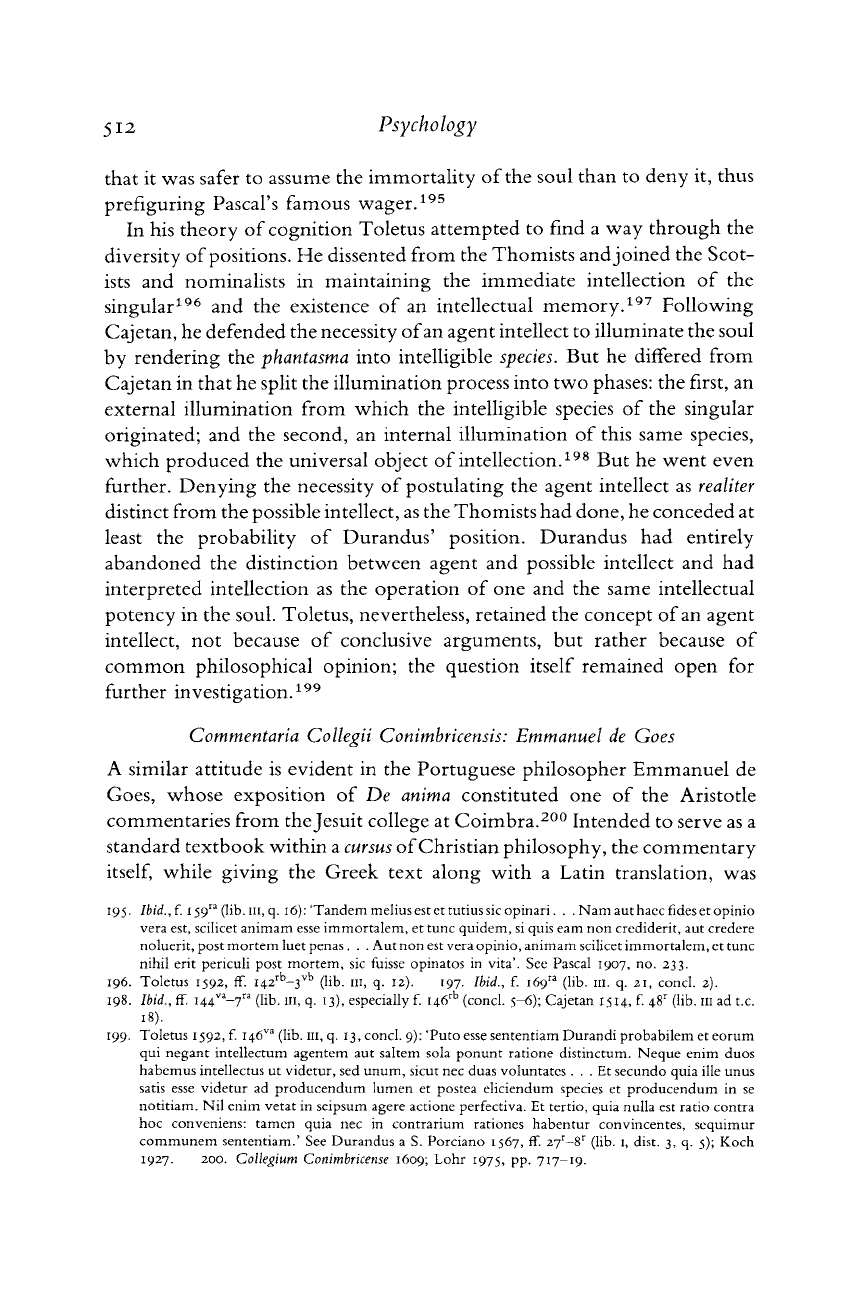
512
Psychology
that
it was
safer
to
assume
the
immortality
of
the soul
than
to
deny
it,
thus
prefiguring Pascal's famous wager.
195
In
his
theory
of
cognition Toletus attempted
to
find
a way
through
the
diversity
of
positions.
He
dissented from
the
Thomists and joined
the
Scot-
ists
and
nominalists
in
maintaining
the
immediate intellection
of the
singular
196
and the
existence
of an
intellectual memory.
197
Following
Cajetan,
he
defended
the
necessity
of
an agent intellect
to
illuminate
the
soul
by
rendering
the
phantasma
into intelligible species.
But he
differed from
Cajetan
in
that
he
split
the
illumination process into
two
phases:
the
first,
an
external illumination from which
the
intelligible species
of the
singular
originated;
and the
second,
an
internal illumination
of
this same species,
which
produced
the
universal object
of
intellection.
198
But he
went even
further.
Denying
the
necessity
of
postulating
the
agent intellect
as
realiter
distinct from
the
possible intellect,
as the
Thomists
had
done,
he
conceded
at
least
the
probability
of
Durandus' position. Durandus
had
entirely
abandoned
the
distinction between agent
and
possible intellect
and had
interpreted
intellection
as the
operation
of one and the
same intellectual
potency
in the
soul. Toletus, nevertheless, retained
the
concept
of an
agent
intellect,
not
because
of
conclusive arguments,
but
rather
because
of
common philosophical opinion;
the
question itself remained open
for
further investigation.
199
Commentaria
Collegii
Conimbricensis: Emmanuel
de
Goes
A similar
attitude
is
evident
in the
Portuguese philosopher Emmanuel
de
Goes,
whose exposition
of De
anima
constituted
one of the
Aristotle
commentaries from the
Jesuit
college
at
Coimbra.
200
Intended
to
serve
as a
standard
textbook within
a
cursus
of
Christian philosophy,
the
commentary
itself, while
giving
the
Greek text along with
a
Latin translation,
was
195.
Ibid.,£.
159" (lib. in, q. 16): 'Tandem melius est ettutius sic opinari. . . Nam authaec fides et opinio
vera
est, scilicet animam
esse
immortalem, et tunc quidem, si quis earn non crediderit, aut credere
noluerit, post mortem luet penas . . . Aut non est vera opinio, animam scilicet immortalem, et tunc
nihil erit periculi post mortem, sic
fuisse
opinatos in vita'. See Pascal 1907, no. 233.
196. Toletus 1592, ff.
I42
rb
-3
vb
(lib. in, q. 12). 197.
Ibid.,
f. 169" (lib. m. q. 21, concl. 2).
198.
Ibid.,
ff.
i44
va
-7
ra
(lib. in, q. 13), especially f.
I46
rb
(concl. 5-6);
Cajetan
1514, f. 48
1
" (lib. m ad t.c.
18).
199.
Toletus 1592, f.
i46
va
(lib. in, q. 13, concl. 9): 'Puto
esse
sententiam Durandi probabilem et eorum
qui
negant intellectum agentem aut saltern sola ponunt ratione distinctum. Neque enim duos
habemus intellectus ut videtur, sed unum, sicut nec duas voluntates . . . Et secundo quia
ille
unus
satis
esse
videtur ad producendum lumen et postea eliciendum species et producendum in se
notitiam. Nil enim vetat in seipsum agere actione perfectiva. Et tertio, quia nulla est ratio contra
hoc conveniens: tamen quia nec in contrarium rationes habentur convincentes, sequimur
communem sententiam.' See Durandus a S. Porciano 1567, fF.
27
r
-8
r
(lib. 1, dist. 3, q. 5); Koch
1927. 200.
Collegium Conimbricense
1609;
Lohr
1975, pp.
717-19.
Cambridge Histories Online © Cambridge University Press, 2008
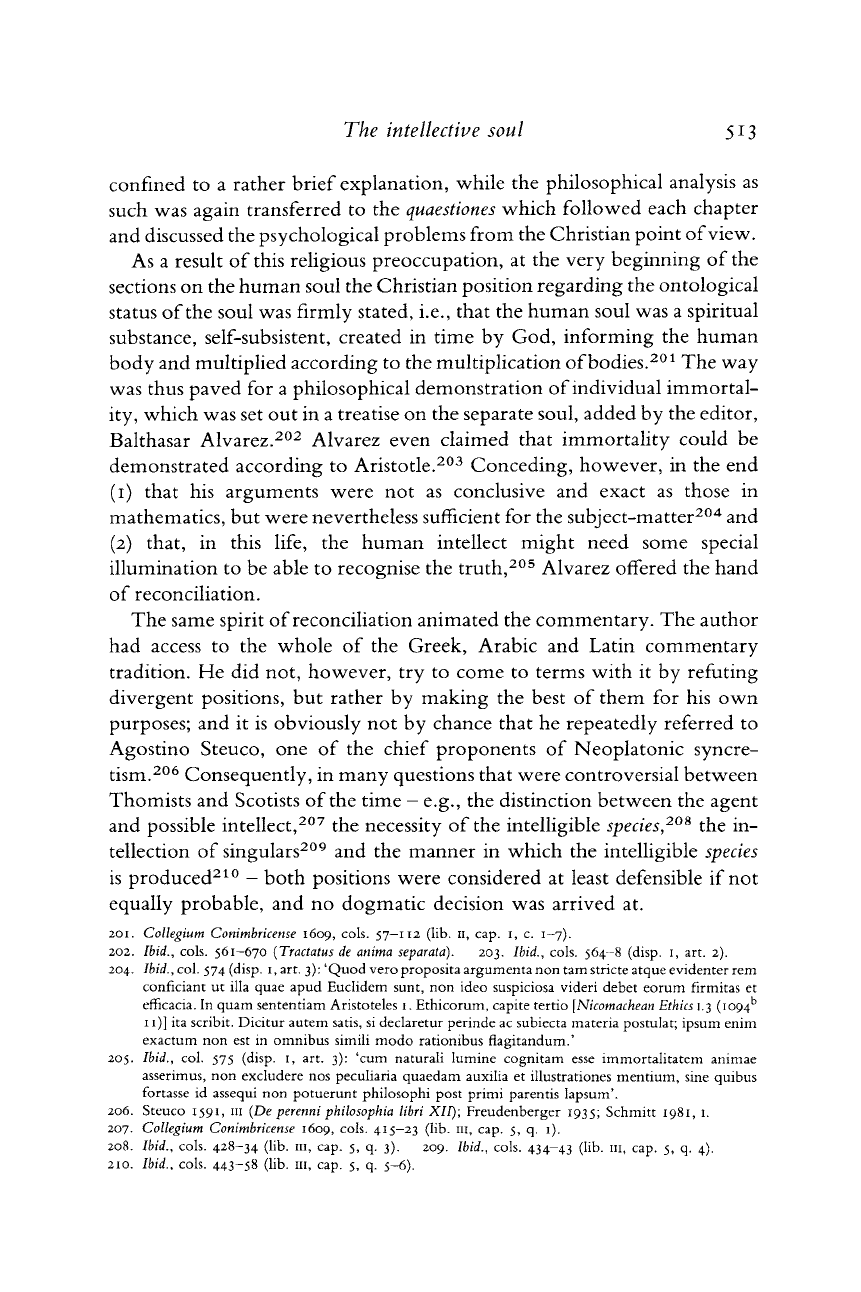
The intellective soul
513
confined
to a
rather
brief explanation, while
the
philosophical analysis
as
such
was
again transferred
to the
quaestiones which
followed
each chapter
and discussed
the
psychological problems from
the
Christian point
of
view.
As
a
result
of
this religious preoccupation,
at the
very beginning
of the
sections
on the
human soul
the
Christian position regarding
the
ontological
status
of
the soul
was
firmly stated,
i.e.,
that
the
human soul
was a
spiritual
substance, self-subsistent, created
in
time
by God,
informing
the
human
body
and
multiplied according
to the
multiplication
of
bodies.
201
The
way
was
thus
paved
for a
philosophical demonstration
of
individual immortal-
ity,
which was
set out in a
treatise
on the
separate soul, added
by the
editor,
Balthasar
Alvarez.
202
Alvarez
even claimed
that
immortality could
be
demonstrated according
to
Aristotle.
203
Conceding, however,
in the end
(1)
that
his
arguments were
not as
conclusive
and
exact
as
those
in
mathematics,
but
were nevertheless sufficient
for the
subject-matter
204
and
(2)
that,
in
this
life,
the
human intellect might need some special
illumination
to be
able
to
recognise
the truth,
205
Alvarez
offered
the
hand
of
reconciliation.
The
same spirit
of
reconciliation animated
the
commentary.
The
author
had access
to the
whole
of the
Greek, Arabic
and
Latin commentary
tradition.
He did not,
however,
try to
come
to
terms
with
it by
refuting
divergent positions,
but
rather
by
making
the
best
of
them
for his own
purposes;
and it is
obviously
not by
chance
that
he
repeatedly referred
to
Agostino
Steuco,
one of the
chief
proponents
of
Neoplatonic syncre-
tism.
206
Consequently,
in
many questions
that
were controversial between
Thomists
and
Scotists
of the
time
—
e.g.,
the
distinction between
the
agent
and possible intellect,
207
the
necessity
of the
intelligible species,
208
the in-
tellection
of
singulars
209
and the
manner
in
which
the
intelligible species
is
produced
210
—
both positions were considered
at
least defensible
if not
equally
probable,
and no
dogmatic decision
was
arrived
at.
201. Collegium Conimbricense
1609, cols.
57—112
(lib. 11, cap. 1, c. 1—7).
202.
Ibid.,
cols. 561—670
(Tractatus
de
anima
separata).
203.
Ibid.,
cols.
564—8
(disp. 1, art. 2).
204.
Ibid.,
col. 574 (disp. 1, art. 3): 'Quod vero proposita argumenta non tarn stricte atque evidenter rem
conficiant ut ilia quae apud Euclidem sunt, non ideo suspiciosa videri debet eorum firmitas et
emcacia. In quam sententiam Aristoteles 1. Ethicorum, capite tertio
[Nicomachean Ethics
1.3
(i094
b
11)]
ita scribit. Dicitur autem satis, si declaretur perinde ac subiecta materia postulat; ipsum enim
exactum non est in omnibus simili modo rationibus flagitandum.'
205.
Ibid.,
col. 575 (disp. 1, art. 3): 'cum naturali lumine cognitam
esse
immortalitatem animae
asserimus, non excludere nos peculiaria quaedam auxilia et illustrationes mentium,
sine
quibus
fortasse id assequi non potuerunt philosophi post primi parentis lapsum'.
206. Steuco 1591, in {De
perenni philosophia libri
XII); Freudenberger 1935; Schmitt 1981, 1.
207.
Collegium Conimbricense
1609, cols. 415—23 (lib. 111, cap. 5, q. 1).
208.
Ibid.,
cols.
428-34
(lib. in, cap. 5, q. 3). 209.
Ibid.,
cols.
434~43
(lib. m, cap. 5, q. 4).
210. Ibid.,
cols.
443-58
(lib. m, cap. 5, q. 5-6).
Cambridge Histories Online © Cambridge University Press, 2008
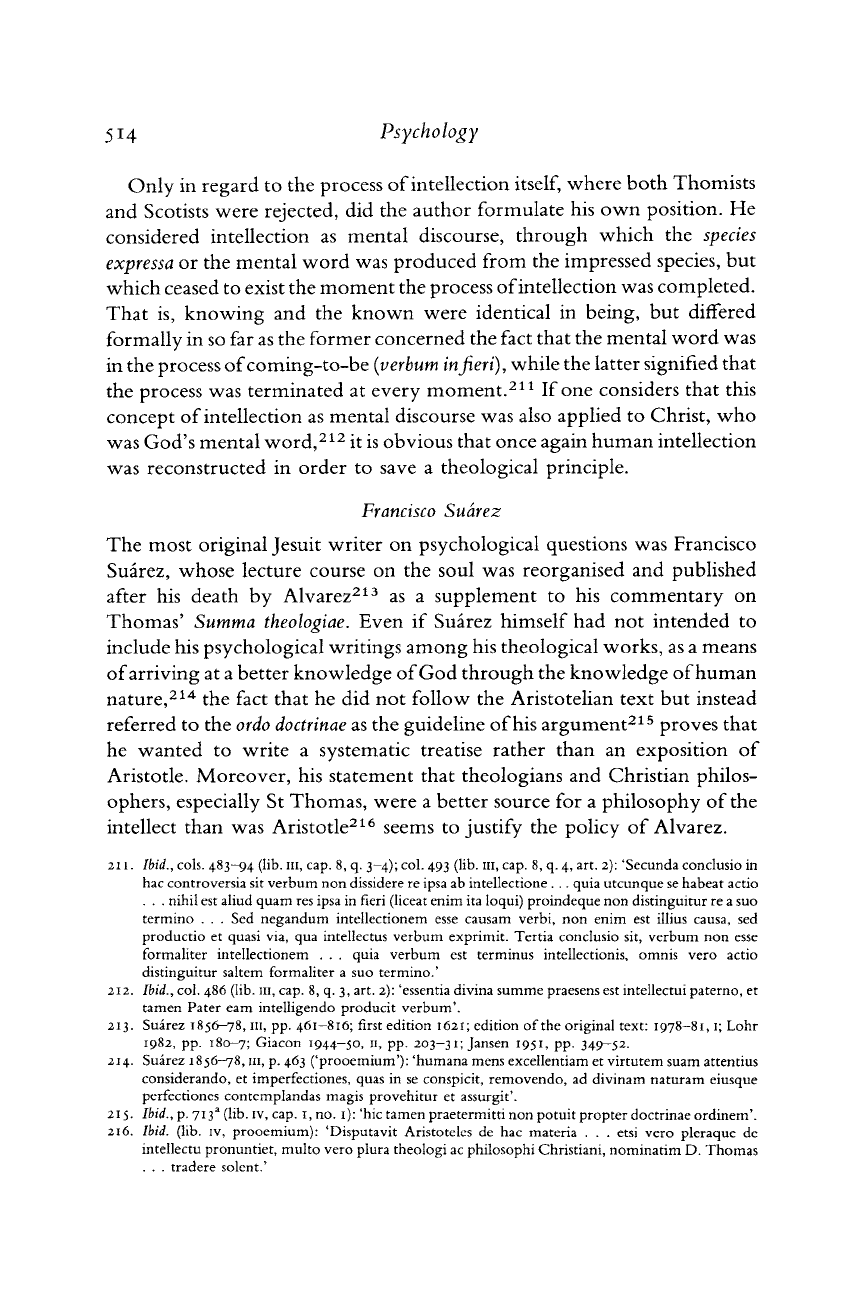
5H
Psychology
Only
in
regard
to the
process
of
intellection itself, where both Thomists
and Scotists were rejected,
did the
author formulate
his own
position.
He
considered intellection
as
mental discourse, through which
the
species
expressa
or the
mental word
was
produced from
the
impressed species,
but
which
ceased
to
exist
the
moment
the
process
of
intellection was completed.
That
is,
knowing
and the
known were identical
in
being,
but
differed
formally
in so far as the
former concerned
the
fact
that
the
mental word
was
in
the
process
of
coming-to-be
(verbum
in fieri), while
the
latter signified
that
the process
was
terminated
at
every moment.
211
If
one considers
that
this
concept
of
intellection
as
mental discourse
was
also applied
to
Christ,
who
was
God's mental word,
212
it
is obvious
that
once again human intellection
was
reconstructed
in
order
to
save
a
theological principle.
Francisco
Suarez
The
most original Jesuit writer
on
psychological questions
was
Francisco
Suarez,
whose lecture course
on the
soul
was
reorganised
and
published
after
his
death
by
Alvarez
213
as a
supplement
to his
commentary
on
Thomas'
Summa
theologiae. Even
if
Suarez himself
had not
intended
to
include
his
psychological writings among
his
theological works,
as a
means
of
arriving
at a
better knowledge
of
God
through
the
knowledge
of
human
nature,
214
the
fact
that
he did not
follow
the
Aristotelian text
but
instead
referred
to the
ordo doctrinae
as the
guideline
of
his argument
215
proves
that
he wanted
to
write
a
systematic treatise
rather
than
an
exposition
of
Aristotle.
Moreover,
his
statement
that
theologians
and
Christian philos-
ophers, especially
St
Thomas, were
a
better source
for a
philosophy
of the
intellect
than
was
Aristotle
216
seems
to
justify
the
policy
of
Alvarez.
211.
Ibid.,
cols.
483—94
(lib. in, cap. 8, q. 3-4); col. 493 (lib. in, cap. 8, q. 4, art. 2): 'Secunda conclusio in
hac controversia sit verbum non dissidere re ipsa ab intellectione .. . quia utcunque se habeat actio
.
. . nihil est aliud quam res ipsa in fieri (liceat enim ita loqui) proindeque non distinguitur re a suo
termino . . . Sed negandum intellectionem
esse
causam verbi, non enim est illius causa, sed
productio et quasi via, qua intellectus verbum exprimit. Tertia conclusio sit, verbum non
esse
formaliter intellectionem . . . quia verbum est terminus intellectionis, omnis vero actio
distinguitur saltern formaliter a suo termino.'
212. Ibid.,
col. 486 (lib. in, cap. 8, q. 3, art. 2): 'essentia divina summe praesens est intellectui paterno, et
tamen Pater earn intelligendo producit verbum'.
213.
Suarez
1856-78,111,
pp. 461-816; first edition 1621; edition of the original text:
1978-81,1;
Lohr
1982,
pp. 180-7; Giacon 1944-50, 11, pp. 203-31; Jansen 1951, PP- 349~52.
214.
Suarez 1856—78,
HI,
p. 463 ('prooemium'): 'humana mens excellentiam et virtutem suam attentius
considerando, et imperfectiones, quas in se conspicit, removendo, ad divinam naturam eiusque
perfectiones contemplandas magis provehitur et assurgit'.
215. Ibid.,
p. 713
s
(lib. iv, cap. 1, no. 1): 'hie tamen praetermitti non potuit propter doctrinae ordinem'.
216. Ibid.
(lib. iv, prooemium): 'Disputavit Aristoteles de hac materia . . . etsi vero pleraque de
intellectu pronuntiet, multo vero plura theologi ac philosophi Christiani, nominatim D. Thomas
.
. . tradere solent.'
Cambridge Histories Online © Cambridge University Press, 2008
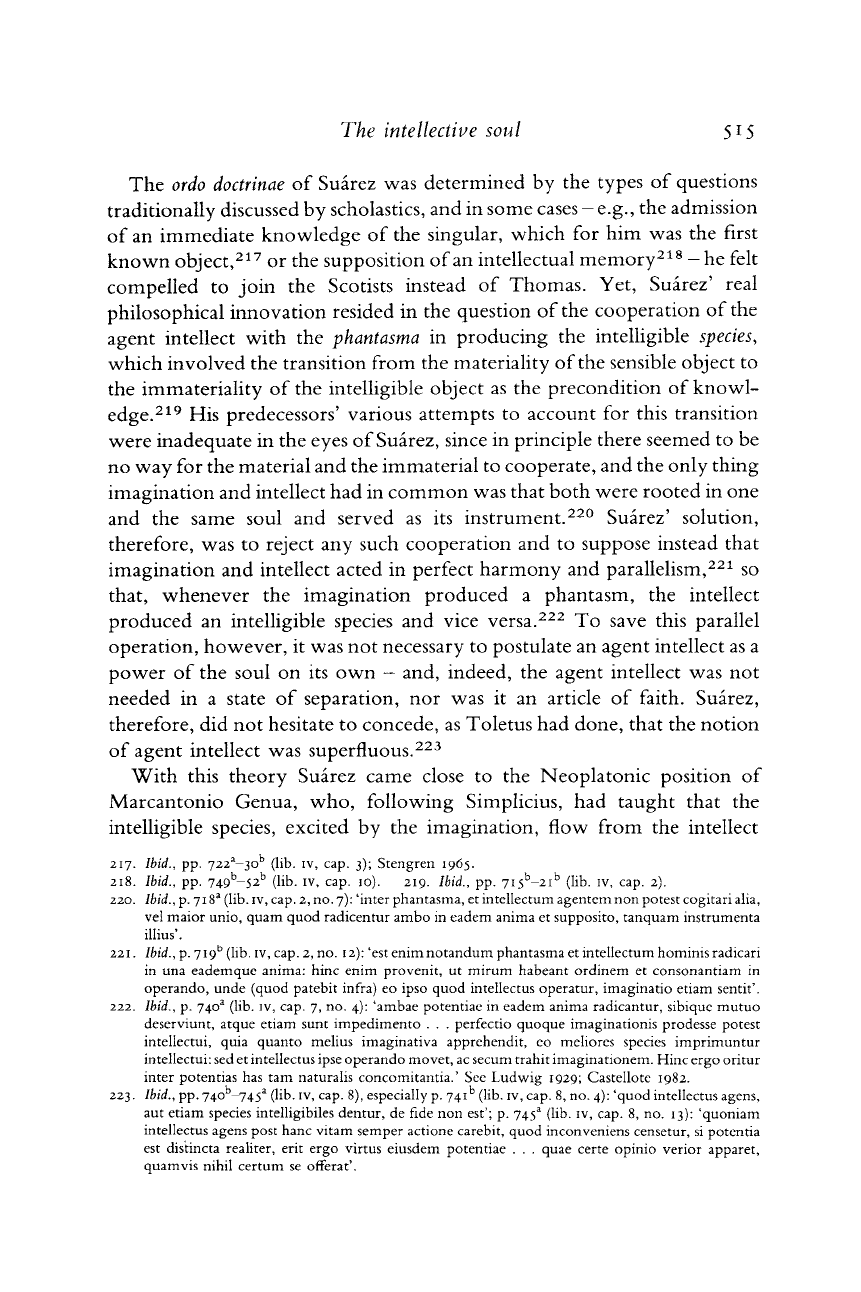
The
intellective soul
515
The
ordo doctrinae
of
Suarez
was
determined
by the
types
of
questions
traditionally discussed
by
scholastics,
and in
some cases
-
e.g.,
the
admission
of
an
immediate knowledge
of the
singular, which
for him was the
first
known
object,
217
or the
supposition
of an
intellectual memory
218
- he
felt
compelled
to
join
the
Scotists instead
of
Thomas.
Yet,
Suarez' real
philosophical
innovation resided
in the
question
of the
cooperation
of the
agent intellect with
the
phantasma
in
producing
the
intelligible species,
which
involved
the
transition from
the
materiality
of
the sensible object
to
the immateriality
of the
intelligible object
as the
precondition
of
knowl-
edge.
219
His
predecessors' various
attempts
to
account
for
this transition
were
inadequate
in the
eyes
of
Suarez, since
in
principle
there
seemed
to be
no way
for the
material
and the
immaterial
to
cooperate,
and the
only thing
imagination
and
intellect
had in
common was
that
both were rooted
in one
and
the
same soul
and
served
as its
instrument.
220
Suarez' solution,
therefore,
was to
reject
any
such cooperation
and to
suppose instead
that
imagination
and
intellect acted
in
perfect harmony
and
parallelism,
221
so
that,
whenever
the
imagination produced
a
phantasm,
the
intellect
produced
an
intelligible species
and
vice
versa.
222
To
save this parallel
operation, however,
it
was
not
necessary
to
postulate
an
agent intellect
as a
power
of the
soul
on its own
—
and,
indeed,
the
agent intellect
was not
needed
in a
state
of
separation,
nor was it an
article
of
faith. Suarez,
therefore,
did not
hesitate
to
concede,
as
Toletus
had
done,
that
the
notion
of
agent intellect
was
superfluous.
223
With
this theory Suarez came close
to the
Neoplatonic position
of
Marcantonio Genua,
who,
following
Simplicius,
had
taught
that
the
intelligible
species, excited
by the
imagination,
flow
from
the
intellect
217. Ibid.,
pp. 722
a
-30
b
(lib. iv, cap. 3); Stengren 1965.
218. Ibid.,
pp. 749
b
-52
b
(lib. iv, cap. 10). 219.
Ibid.,
pp. 7i5
b
-2i
b
(lib. iv, cap. 2).
220.
Ibid.,
p. 718
a
(lib. iv, cap. 2, no. 7): 'inter phantasma, et intellectum agentem non potest cogitari alia,
vel
maior unio, quam quod radicentur ambo in eadem anima et supposito, tanquam instrumenta
illius'.
221. Ibid.,
p.
7i9
b
(lib. iv, cap. 2, no. 12): 'est enim notandum phantasma et intellectum hominis radicari
in una eademque anima: hinc enim provenit, ut mirum habeant ordinem et consonantiam in
operando, unde (quod patebit infra) eo
ipso
quod intellectus operatur, imaginatio etiam sentit'.
222.
Ibid.,
p. 740
s
(lib. iv, cap. 7, no. 4): 'ambae potentiae in eadem anima radicantur, sibique mutuo
deserviunt, atque etiam sunt impedimento . . . perfectio quoque imaginationis prodesse potest
intellectui, quia quanto melius imaginativa apprehendit, eo meliores
species
imprimuntur
intellectui: sed et intellectus
ipse
operando movet, ac secum trahit imaginationem. Hinc ergo oritur
inter potentias has tarn naturalis concomitantia.' See
Ludwig
1929; Castellote 1982.
223.
Ibid.,
pp. 740
b
-745
a
(lib. iv, cap. 8), especially p. 74i
b
(lib. iv, cap. 8, no. 4): 'quod intellectus agens,
aut
etiam
species
intelligibiles dentur, de fide non est'; p.
745
a
(lib. iv, cap. 8, no. 13): 'quoniam
intellectus agens post hanc vitam semper actione carebit, quod inconveniens censetur, si potentia
est distincta realiter, erit ergo virtus eiusdem potentiae . . . quae certe opinio verior apparet,
quam
vis nihil certum se offerat'.
Cambridge Histories Online © Cambridge University Press, 2008
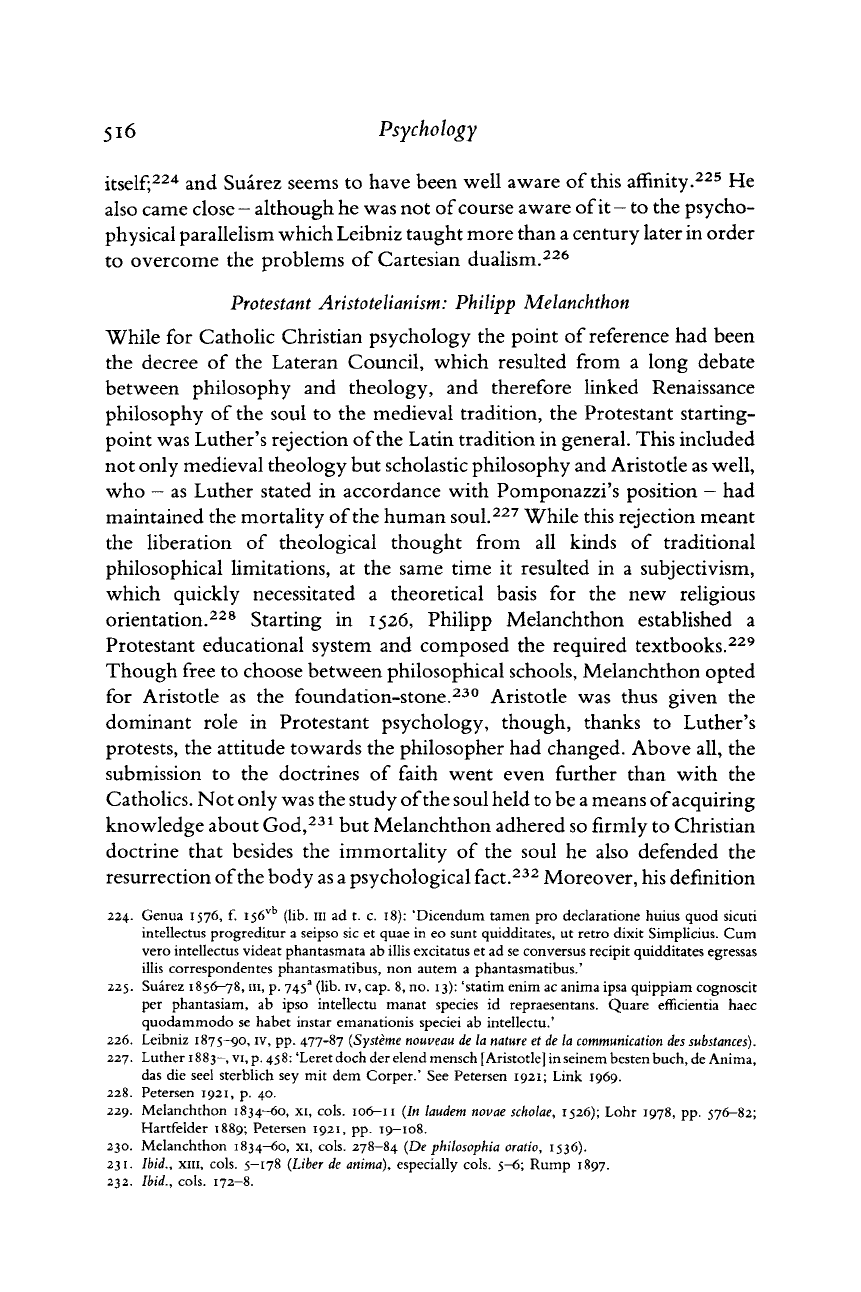
5
i6
Psychology
itself;
224
and
Suárez seems
to
have been
well
aware
of
this affinity.
225
He
also
came close
-
although
he
was
not
of
course aware
of
it
- to the
psycho-
physical
parallelism which Leibniz taught more
than
a
century later
in
order
to overcome
the
problems
of
Cartesian dualism.
226
Protestant Aristotelianism: Philipp Melanchthon
While
for
Catholic Christian psychology
the
point
of
reference
had
been
the decree
of the
Lateran
Council,
which resulted from
a
long debate
between
philosophy
and
theology,
and
therefore linked Renaissance
philosophy
of the
soul
to the
medieval tradition,
the
Protestant starting-
point was Luther's rejection
of
the Latin tradition
in
general. This included
not only medieval theology
but
scholastic philosophy
and
Aristotle
as
well,
who
—
as
Luther stated
in
accordance with Pomponazzi's position
—
had
maintained
the
mortality
of
the human soul.
227
While this rejection meant
the liberation
of
theological thought from
all
kinds
of
traditional
philosophical
limitations,
at the
same time
it
resulted
in a
subjectivism,
which
quickly necessitated
a
theoretical basis
for the new
religious
orientation.
228
Starting
in 1526,
Philipp Melanchthon established
a
Protestant educational system
and
composed
the
required textbooks.
229
Though
free
to
choose between philosophical schools, Melanchthon opted
for
Aristotle
as the
foundation-stone.
230
Aristotle
was
thus
given
the
dominant role
in
Protestant psychology, though, thanks
to
Luther's
protests,
the
attitude
towards
the
philosopher
had
changed.
Above
all,
the
submission
to the
doctrines
of
faith went even further
than
with
the
Catholics.
Not
only was
the
study
of
the soul held
to be a
means
of
acquiring
knowledge
about God,
231
but
Melanchthon adhered
so
firmly
to
Christian
doctrine
that
besides
the
immortality
of the
soul
he
also defended
the
resurrection
of
the body as
a
psychological
fact.
232
Moreover, his definition
224. Genua 1576, f. i56
vb
(lib.
111
ad t. c. 18): 'Dicendum tarnen pro declaratione huius quod sicuti
intellectus progreditur a
seipso
sic et quae in eo sunt quidditates, ut retro dixit Simplicius. Cum
vero
intellectus videat phantasmata ab
illis
excitatus et ad se conversus recipit quidditates egressas
illis
correspondentes phantasmatibus, non autem a phantasmatibus.'
225.
Suárez 1856-78, in, p. 745
a
(lib. iv, cap. 8, no. 13): 'statim enim ac anima ipsa quippiam cognoscit
per
phantasiam, ab ipso intellectu manat species id repraesentans. Quare efficientia haec
quodammodo
se habet instar emanationis speciei ab intellectu.'
226. Leibniz 1875-90, iv, pp. 477-87
(Systeme
nouveau
de la
nature
et de la
communication
des
substances).
227.
Luther 1883-, vi, p. 458: 'Leret doch der elend mensch [Aristotle] in seinem besten buch, de Anima,
das die
seel
sterblich sey mit dem
Corper.'
See Petersen 1921;
Link
1969.
228. Petersen 1921, p. 40.
229. Melanchthon 1834-60, xi, cois.
106-11
(In
laudem novae scholae,
1526);
Lohr
1978, pp. 576-82;
Hartfelder
1889; Petersen 1921, pp. 19—108.
230. Melanchthon 1834-60, xi, cois.
278-84
(De
philosophia oratio,
1536).
231. Ibid.,
xiii, cois. 5-178
(Liber
de
anima),
especially cols. 5-6; Rump 1897.
232. Ibid.,
cols.
172-8.
Cambridge Histories Online © Cambridge University Press, 2008
